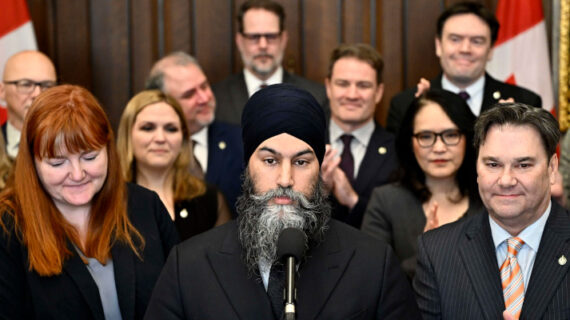- Charles Sousa is set to officially join Justin Trudeau’s Liberal caucus on Monday after winning the Mississauga-Lakeshore byelection on December 12, 2022.
- With a lengthy history in the corporate and business worlds and a proclivity towards "suburban sensibilities", Sousa may prove to be a moderating influence on the government's high-spending instincts, insiders say.
- His influence could be particularly profound if Sousa is elevated to the position of a cabinet minister in any upcoming shuffle.
This week, Prime Minister Justin Trudeau and his Cabinet met for a three-day retreat in Hamilton to plan for the government’s legislative and policy agenda for the upcoming parliamentary session. One voice who wasn’t around the Cabinet table but may be in the near future is Charles Sousa. The former Ontario finance minister will officially join the Liberal Caucus next week after winning the Mississauga-Lakeshore byelection in mid-December 2022.
While captaining a tight fiscal ship hasn’t been a top priority for the Trudeau government, Sousa’s impending presence may lend some much-needed fiscal credibility to its policy agenda, particularly if a cabinet shuffle places him in an influential role.
With a lengthy history in the business and corporate world, Sousa is almost a throwback to previous generations of Liberals from the banking and finance sector who would lose sleep over budget deficits. Prior to the byelection, Sousa sat or directed several boards, led numerous real-estate developments, and was involved in financial services consultations.
“Most of the colleagues that called on me to do this run was to…be a strong voice, a positive voice to engage with the business community and the economic growth plans that need to be done in order to sustain the programs that matter to people,” says Sousa.
Founding a small financial services company in 1982, Sousa went on to work in high-level positions at Royal Bank from 1987 until 2007 when he was elected as an Ontario Liberal MPP for the Mississauga-Lakeshore riding, named identically to its federal counterpart.
Sousa became Premier Kathleen Wynne’s finance minister in 2013, and was described as “arguably the second-most powerful individual in the province.” That lasted until 2018 when he lost his seat, though by a closer margin than most other Liberal incumbents, who were typically blown out of the water in that year’s provincial election.
Sousa’s re-entry into politics, this time federally, coincides with the Trudeau government’s professed plan for less-unbalanced budgets than usual as the Bank of Canada hikes rates to combat inflation.
“I think he knows and understands the business community because he’s been part of it, both big and small. So I think that’s a good perspective to have in the Liberal caucus,” says Bob Richardson, a former Ontario Liberal chief of staff.
However, with an election likely within the next three years, retaining Toronto’s suburbs might take precedence over reassuring the Chamber of Commerce. Choosing Sousa as the byelection candidate might have been Trudeau’s latest bid to convince Golden Horseshoe families not to vote Conservative.
Richardson says Sousa brings “suburban sensibilities” to the table.
“He understands what’s going on in communities like Mississauga, as an example, the growth that’s going on, what’s required from a transit perspective, some of the pressures that they’re having on services as well. I think having that knowledge is helpful,” says Richardson.
Sousa was born in 1958 and raised first in Toronto’s Kensington Market before his family moved to Mississauga, where he still lives. He makes sure to point out that, like thousands of other GTA residents, he always made the daily commute to and from Queen’s Park as an MPP.
When talking to people in his riding, Sousa says the primary concerns he hears about are the welfare of their families and being able to get good jobs, rather than partisan loyalty.
“They don’t care if I’m a Liberal or a Conservative, they don’t care if I’m the mayor, or the counselor, or provincial or federal, all they care about is ‘What are you guys doing to get my life in order’,” says Sousa. “These people all have the same concerns, regardless of where they’re from.”
A recent Abacus poll suggested more Canadians currently trust the Conservatives than the Liberal government to handle health care, the economy, and the rising cost of living.
“Given where the Conservatives may be going…having someone who is aware of those bread and butter issues, those economic issues is going to be important, given the fact that the leader of the Opposition is also focused on those issues,” says Ali Ghiassi, Sousa’s former chief of staff while he was Ontario’s finance minister.
Ghiassi says his former boss’s entry into federal politics reflects Canada’s changing economic climate, which commentators say bodes poorly for Justin Trudeau’s preference for deficit spending.
“I think in the last 15 months, things have really changed when it comes to inflation…having a voice in the caucus that has heard from constituents at the electoral box in the last few weeks is particularly important,” says Ali Ghiassi. “I think the dynamics have changed, and I think the government is quite aware of that.”
Wynne and Sousa’s Liberal government posted just one balanced budget during his five years on the job, perhaps against Sousa’s own instincts.

A staunch free marketer and fiscal conservative as a younger man, Sousa’s views changed by the time he became a politician. However, he is still often described as more moderate than many of his colleagues.
While Sousa did cut small business taxes while Ontario’s finance minister, he also helped craft one of the largest infrastructure spending plans in the province’s history, to the tune of more than $130 billion.
“I’m not extreme at any spectrum of the political realm, so to speak, I am very much a centric guy,” says Sousa.
With the Conservatives only needing to win a modest share of Greater Toronto Area ridings to defeat the Liberal government in the next election, Ghiassi says Sousa can help attract more centrist, and perhaps even some centre-right voters, to the Liberals.
“Having someone with his background, both in the private sector and also in provincial governments where you tend to be a little bit closer to program delivery, I think would benefit the Trudeau government. Whether they choose to put him in cabinet is ultimately their decision,” says Ghiassi.
Regardless of whether he becomes a cabinet minister, Charles Sousa is entering parliament as a different kind of Trudeau Liberal. Whether he leaves that way remains to be seen.




